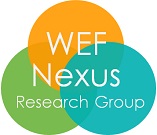Achieving water, energy and food security; Harmonizing humans with nature; Implementing integrated solutions: these require holistic and systems level thinking – this is the Water-Energy-Food Nexus.
About the WEF Nexus: Global shifts in risks and the changes associated with water, energy, and food securities are the focus of the TAMU Water-Energy-Food Nexus Research Group. Special attention is paid to the interconnectedness of these three primary resource portfolios. The WEF Nexus builds on the integrated water resources management and introduces an holistic, trans-disciplinary, inclusive multi-stakeholder platform for resource allocation. The nexus platform allows the identification of local and site specific tradeoffs and hotspots, which facilitate dialogue among stakeholders. From among those hotspots, the role of soils in global water and food security, and the vital function of soil as a structured, dynamic, natural, organized system and of green water to food and water securities is explored. The group focus is upon localization of resources, use of the nexus platform, improved utilization of greenwater, and better understating the impacts of water reuse on the soil–water ecosystem.
contact: Professor Rabi H. Mohtar [mohtar@tamu.edu] or [mohtar@aub.edu.lb]
The American University of Beirut (AUB) and Texas A&M University (TAMU) held a joint webinar to present the findings published in the Science of the Total Environment (STOTEN) Special Issue: Opportunities in the Water-Energy-Food Nexus Approach: Innovatively driving economic development, social well-being, and environmental sustainability.
The event was the culmination of the experience of the Texas A&M University Water-Energy-Food Nexus Initiative (WEFNI) in creating a University wide, four year, investigatory experience, led by Rabi Mohtar, WEFNI Coordinator, TEES Research Professor, and Dean of the Faculty of Agricultural and Food Sciences (FAFS), American University of Beirut (AUB). The Special Issue reflects the process of creating interdisciplinary teams and presents an overview of the two year period, during which research was conducted under thematic foci: data and modeling, trade-off analysis, water for food, water for energy, and governance. Lessons learned from the San Antonio experience are presented and their potential transferability to other resource hotspots globally are discussed.
The webinar also introduced a new AUB initiative, led by Mohtar: The Water-Energy-Food-Health Nexus Renewable Resources Initiative, (WEFRAH). This initiative builds on the work begun at TAMU and paves the way for new collaborations, partnerships, and engagement between the two institutions per the recently signed AUB-TAMU MoU.
For more information about the special issue, visit our publications page.

 WEF Nexus Research Group
WEF Nexus Research Group